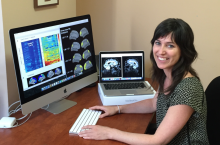U.S. government health officials approved the first new drug for Alzheimer's disease in nearly 20 years, disregarding warnings from independent advisers that the much-debated treatment hasn't been shown to help slow the brain-destroying disease. The Food and Drug Administration (FDA) said it granted approval to the drug from Biogen based on results that seemed “reasonably likely” to benefit Alzheimer's patients. (CTV News)


New research from McGill University has found that the presence and severity of mild behavioural impairment (MBI) in cognitively healthy individuals is strongly associated with the presence of amyloid plaques deposits in the brain, a hallmark of Alzheimer’s disease.
For years, physicians have been aware that patients carrying the apolipoprotein ꜫ4 (APOE ꜫ4) gene are at a greater risk of developing Alzheimer’s disease. New research from McGill University has now found the gene plays an even greater role in dementia.
The World Alzheimer Report 2018, The state of the art of dementia research: New frontiers brings together 21 of the global leading lights in all areas of dementia research. Written by renowned journalist and broadcaster Christina Patterson (Time Magazine, The Guardian, The Sunday Times), this report tackles some of the complex questions surrounding dementia research. It looks at the hopes and frustrations and asks why there have been no major medical treatment breakthroughs for over 20 years.
A team of scientists has successfully trained a new artificial intelligence (AI) algorithm to make accurate predictions regarding cognitive decline leading to Alzheimer’s disease.

Finding is key for future treatment and earlier diagnosis
Scientists at the Montreal Neurological Institute and Hospital (The Neuro) of McGill University have used a unique approach to track brain degeneration in Alzheimer’s disease, uncovering a pathway through which degeneration spreads from one region to another.

You’re about to turn 60, and you’re fretting. Your mother has had Alzheimer’s disease since the age of 65. At what age will the disease strike you? A Canadian study published in JAMA Neurology shows that the closer a person gets to the age at which their parent exhibited the first signs of Alzheimer’s, the more likely they are to have amyloid plaques, the cause of the cognitive decline associated with the disease, in their brain.

By Chris Chipello
McGill University researchers have discovered a cellular mechanism that may contribute to the breakdown of communication between neurons in Alzheimer’s disease.

By the time you start losing your memory, it's almost too late. That's because the damage to your brain associated with Alzheimer’s disease (AD) may already have been going on for as long as twenty years. Which is why there is so much scientific interest in finding ways to detect the presence of the disease early on. Scientists now believe that simple odour identification tests may help track the progression of the disease before symptoms actually appear, particularly among those at risk.

Research underlines importance of computational power in future neurological breakthrough
Scientists at the Montreal Neurological Institute and Hospital have used a powerful tool to better understand the progression of late-onset Alzheimer’s disease (LOAD), identifying its first physiological signs.
Dr. Gustavo Turecki along with Dr. Juan Pablo Lopez speak about the identification of a molecule that predicts treatment response for depressed patients.
To watch, please click here.
Dr. Judes Poirier speaks about his discovery of the genetic variation that protects 25% of the population from Alzheimer's.
To watch, please click here.
A study just published in the prestigious Nature Neuroscience journal by, Sylvain Williams, PhD, and his team, of the Research Centre of the Douglas Mental Health University Institute and McGill University, opens the door towards better understanding of the neural circuitry and dynamic mechanisms controlling memory as well of the role of an essential element of the hippocampus – a sub-region named the subiculum.
A new study shows that memory pathology in older mice with Alzheimer’s disease can be reversed with treatment. The study by researchers from the Montreal Neurological Institute and Hospital - The Neuro, at McGill University and at Université de Montréal found that blocking the activity of a specific receptor in the brain of mice with advanced Alzheimer’s disease (AD) recovers memory and cerebrovascular function. The results, published in the Journal of Neuroinflammation in May, also suggest an underlying mechanism of AD as a potential target for new therapies.

January 28, 2013 - A revolutionary technology has the ability to detect and diagnose Alzheimer’s disease with unprecedented accuracy. The computerized technique known as SNIPE analyzes magnetic resonance imaging (MRI) scans to capture patterns of atrophy specific to the disease in brain structures, specifically the hippocampus and entorhinal cortex. Diagnosing Alzheimer’s disease (AD) is still an inexact science, relying mainly on the patient's symptoms and performance on memory tests. Detecting pre-clinical AD, before symptoms appear, is extremely difficult.
International study with researchers at The Neuro reveals links with other neurodegenerative diseases
MONTREAL, October 9, 2012 - Scientists at the Montreal Neurological Institute and Hospital – The Neuro, McGill University working with a team at Oxford University have uncovered the genetic defect underlying a group of rare genetic disorders.
